六年级英语语法 第七单元 词汇语法解析素材(1) 牛津版
上海牛津沪教版六年级(下)同步讲义unit7

第七讲Unit7 Travelling in Garden City上海牛津沪教版六年级(下)同步讲义Unit7 Travelling in Garden City适用学科初中英语适用年级初中六年级适用区域上海课时时长(分钟)120分钟(一对一)知识点知识点1:本单元词汇知识点2:词组知识点3:句型知识点4:不定代词的用法知识点5:形容词比较级知识点6:一般将来时态教学目标知识:学生能够基本掌握6年级下册Unit7中的词汇、词组、句型及语法。
方法:牢记各个知识点的用法,归纳总结异同点,通过习题加强巩固。
能力:熟练掌握各种词汇的用法;具备准确判断词性及转换的能力;熟练掌握形容词比较级的运用能力;熟练运用一般将来时和不定代词的能力。
教学重点词性转换;形容词比较级;不定代词用法教学难点形容词比较级用法教学过程一、课堂导入教师讲述一个与本节课题目有关的英文小故事,引出今日所要讲解的知识点,然后让学生简单梳理一下所涉及的问题,带着问题学习本节课的内容。
二、复习预习教师引导学生复习上节课学的重点内容,检测单词的用法,(以提问、回顾的形式进行),针对上节课的作业进行讲评、订正、答疑,并通过英文小故事导入本节课所要学习的新知识。
三、知识讲解1. 知识点一:重点单词1)fare [feə]【词性】n.【词义】车费;乘客;伙食【易混淆点】fee n.服务费【经典例句】They put their money in a fare box他们把他们的钱投进投币箱。
2)public ['pʌblɪk]【词性】adj.【词义】公共的;公众的【易混淆点】in public:公开地;当众的in the public:公众【经典例句】They put their money in a fare box or use a public transportation card instead.他们把钱投进投币箱或使用公共交通卡。
上海市牛津英语六年级七单元笔记(Notes).(1)

1. We must wait for the green man. (否定句) We must not wait for the green man. 2. They must enter here.(一般疑问句) Must they enter here? 肯定回答: Yes, they must. 否定回答: No, they needn’t./ No, they don’t have to. 3. Danny must leave rubbish in the bins.(划线提问) What must Danny do?
must 必须,应该,一定,准是,表示说话人认为有必 要做某事,命令,要求别人做某事以及对事物的推 测.
must 用来指一般现在时和一般将来时, 过去式可以用have to 的过去式代替.
must和have to 的区别: must表示说话人的主观思想, have to表示客观需要.
1. We must obey the class rules.
11.Climb the trees.(改成否定句) ________ _________ the trees. 12. We can find that sign in a museum.(对 划线部分提问) ________ _________ we find that sign? 13.Peter took the left lift.(对划线部分提问) ________ lift_______ Peter take? 14.The little girl is making a model plane. (对划线部分进行提问) ________ ________ the little boy making? 15. Cross the road. (保持原句不变) ________ ________ the road.
六年级英语上Unit7 Protect the Earth重点知识(新版牛津英语)
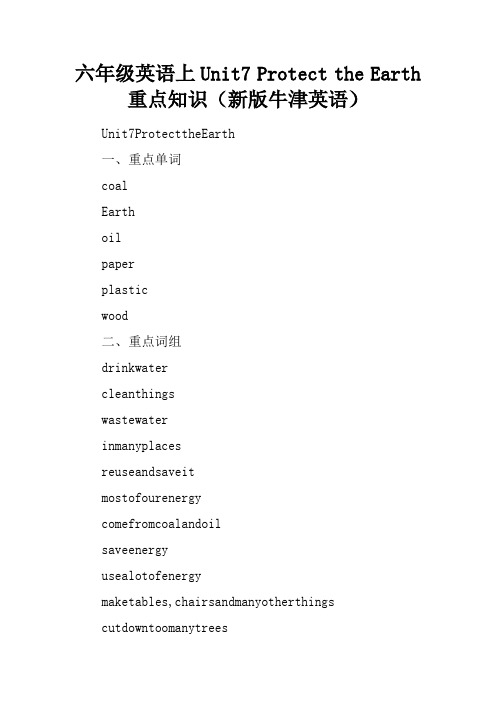
养 高 提 人 更 时 同 现 体 具 力 实 软 化 文 家 个 一 也 志 标 要 重 的 质 素 民 国 是 仅 不 , 书 读
统 良 优 族 民 华 中 就 来 历 ”, 世 继 诗 家 传 读 “耕 。 梯 阶 步 进 晶 结 慧 智 、 体 载 的 识 知 类 人 是 籍 书
六年级英语上 Unit7 Protect the Earth 重点知识(新版牛津英语)
Unit7ProtecttheEarth 一、重点单词 coal Earth oil paper plastic wood 二、重点词组 drinkwater cleanthings wastewater inmanyplaces reuseandsaveit mostofourenergy comefromcoalandoil saveenergy usealotofenergy maketables,chairsandmanyotherthings cutdowntoomanytrees
养 高 提 人 更 时 同 现 体 具 力 实 软 化 文 家 个 一 也 志 标 要 重 的 质 素 民 国 是 仅 不 , 书 读
统 良 优 族 民 华 中 就 来 历 ”, 世 继 诗 家 传 读 “耕 。 梯 阶 步 进 晶 结 慧 智 、 体 载 的 识 知 类 人 是 籍 书
bebadfor plasticbagsandbottles paperbag glassbottle havefun makeaposter startdrawing looknice drawsomebananasonthetrees puti识点 、beuseful 2、mostof 3、comefrom=befrom 4、ThereisnotmuchcoaloroilonEarth. 5、use…tomake… 6、becausetreeshelpkeeptheairclean 7、bebadfor begoodfor 8、startdrawing startdoing
牛津译林版小学六年级英语上册 Unit7 单元知识 总结
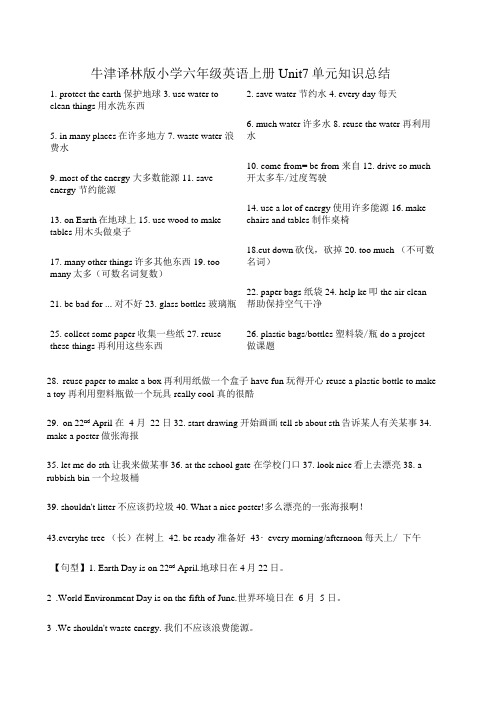
牛津译林版小学六年级英语上册Unit7单元知识总结1. protect the earth 保护地球3. use water to clean things 用水洗东西5. in many places在许多地方7. waste water 浪费水9. most of the energy 大多数能源11. save energy 节约能源13. on Earth在地球上15. use wood to make tables 用木头做桌子17. many other things许多其他东西19. too many太多(可数名词复数)21. be bad for ...对不好23. glass bottles 玻璃瓶25. collect some paper 收集一些纸27. reuse these things再利用这些东西2. save water 节约水4. every day 每天6. much water 许多水8. reuse the water 再利用水10. come from= be from 来自12. drive so much 开太多车/过度驾驶14. use a lot of energy使用许多能源16. make chairs and tables 制作桌椅18.cut down砍伐,砍掉20. too much (不可数名词)22. paper bags 纸袋24. help ke叩the air clean 帮助保持空气干净26. plastic bags/bottles 塑料袋/瓶do a project 做课题28.reuse paper to make a box再利用纸做一个盒子have fun 玩得开心reuse a plastic bottle to makea toy 再利用塑料瓶做一个玩具really cool 真的很酷29.on 22nd April 在4 月22 日32. start drawing 开始画画tell sb about sth告诉某人有关某事34. make a poster做张海报35. let me do sth 让我来做某事36. at the school gate 在学校门口37. look nice看上去漂亮38. a rubbish bin 一个垃圾桶39. shouldn't litter不应该扔垃圾40. What a nice poster!多么漂亮的一张海报啊!43.everyhe tree (长)在树上42. be ready 准备好43・every morning/afternoon 每天上/ 下午【句型】1. Earth Day is on 22nd April.地球日在4月22日。
Unit7知识点梳理牛津上海版(试用本)六年级英语上册
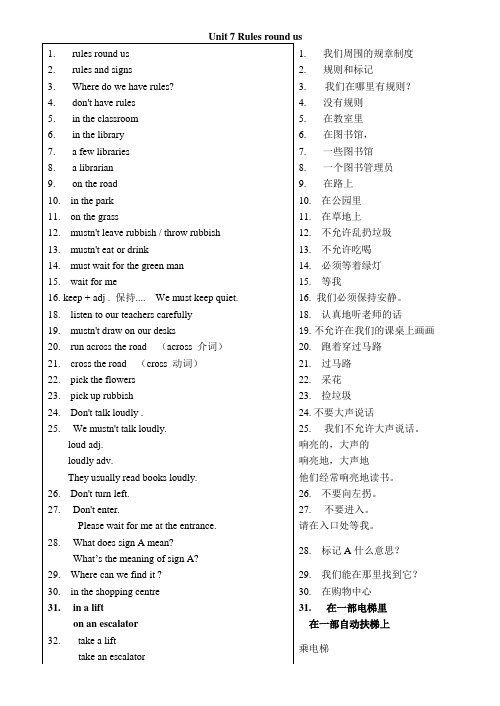
2.规则和标记3.我们在哪里有规则?4.没有规则5.在教室里6.在图书馆,7.一些图书馆8.一个图书管理员9.在路上10.在公园里11.在草地上12.不允许乱扔垃圾13.不允许吃喝14.必须等着绿灯15.等我16.我们必须保持安静。
18.认真地听老师的话19.不允许在我们的课桌上画画20.跑着穿过马路21.过马路22.采花23.捡垃圾24.不要大声说话25. 我们不允许大声说话。
响亮的,大声的响亮地,大声地他们经常响亮地读书。
26.不要向左拐。
27. 不要进入。
请在入口处等我。
28.标记A什么意思?29.我们能在那里找到它?30.在购物中心31. 在一部电梯里在一部自动扶梯上乘电梯34.进入中心报名参加(活动,比赛)她报名参加了校合唱队。
35.在右边36.在你右边37.使用在左边的一个38.上楼/ 下楼我们必须使用哪部行人电梯?40.中间的那部(电梯)41.在。
的中间42.我们有哪些班级规则?43.违反班级规则44.遵守规则45.互相追逐46.我们不允许上学迟到。
47.在课上听老师48我们必须使用哪扇门?49.我们必须做什么?50.这意味着我们不可以向左转。
不要开车进入这条街。
53.upstairs adv. 在楼上,向楼上downstairs 在楼下,向楼下54.出口在左边。
55.此处禁止吸烟。
56.告诉某人不要做某事这个标志告诉我们不要在班级大喊大叫。
一.情态动词must的用法:(1)情态动词,意为“必须”,可用于肯定句、否定句或疑问句。
We must find a good way to learn English well.我们必须找一个学好英语的好方法。
(2)must 的否定式是must not/mustn’t,意思是“禁止”。
如:You mustn’t play soccer in the street.你们不能在大街上踢球。
(3)由must引出的一般疑问句,肯定回答用must,否定回答用needn’t//don't need to // don't haveto.但不能用mustn’t。
上海市牛津英语六年级七单元笔记(Notes).(1)

4. rules round us round (prep.) = around 在……周围 (adj.) 圆的 a round face 5. in the classroom/ library/ park on the road on the left/ right 在左边/ 右边 in the middle 在中间 draw on the desk be late for class walk on the grass
2. Must的用法
肯定句: --我们必须遵守交通法规。 We must obey the traffic rules. 否定句: --你们严禁在教室里互相追逐。 You must not chase each other in the classroom. 一般疑问句: --他们在课堂上必须听老师的话吗? Must they listen to the teacher in class? 肯(否)定回答: Yes, … must. No, … needn’t.
4. She can climb the tree. ree? 5. Jill can’t walk on the grass.(划线提问) What can’t Jill do? 6. Jump and run. (否定句) Don’t jump or run. 7. Listen to the music. (反意疑问句) Listen to the music, will you? 8. Let’s use the one on the right. (反意疑问 句) Let’s use the one on the right, shall we?
1.They _____ speak Chinese in a Chinese class.( can, must) 2.A: Must we open the window now? B: I’m afraid you _________.(must, needn’t) 3. Students _______eat or drink in class. (mustn’t, don’t) 4.Jerry, _____ walk on the grass. (can’t ,don’t) 5.Please bring me some bread tomorrow. ______________.(Yes, I must; Yes ,I will)
沪教牛津版六年级下册英语素材-unit7-9知识点

Unit7知识点1.英语单词的音节:音节是读音的基本单位。
任何一个单词的读音,都可以分解为一个个音节进行朗读。
在英语中,元音字母(a e i o u 共五个)特别响亮。
一个元音因素(元音因素不是元音字母,英语里面有20个元音因素)可构成一个音节,例如:bag一个元音因素和一个或几个辅音因素结合也可以构成一个音节。
例如:egg, an, tea 等。
一般来说元音可以构成音节,辅音不响亮,不能构成音节。
但英语辅音因素中有4个辅音/m/ /n/ /ng/ /l/是响音,它们和辅音因素组合,也可以构成音节,它们构成的音节往往出现在词尾,一般是非重读音节。
例如:ta-ble 英语的词有一个音节的,两个音节的,多个音节的。
一个音节叫单音节词,两个音双音节词,两个音节以上的叫多音节词。
例如:take 是单音节词(末尾的e没有发音,所以是单音节词)ta-ble 是双音节词po-ta-to 是多音节词注意:不要将元音和元音字母搞混。
划分音节是按元音来划的,如果元音字母不发音,那就不能构成音节了。
如果有两个元音字母在一起,但只发一个元音,仍然算一个音节。
2.询问别人怎么啦?可以用:What’s the matter?或What’s wrong?3.find 寻找,找到(强调结果)例如:I can’t find my dog.look for 寻找(强调过程) 例如:I am looking for my pen.4.look like “长什么样”例如:What does your dog look like?5.hour “小时”里面的h不发音,所以一个小时要说:an hour.half an hour “半小时”minute 分钟second 秒6.also 也(常用于肯定句中,动词之前,助动词、系动词之后) 例如:I also like that film.too 也(常用肯定语句末,与前句用逗号隔开)例如:Lucy likes that film,too .either 也(常用于否定句末)例如:Lily doesn’t like this book, I don’t like it either.6.in + 一段时间表示“…时间以后”例如:Let’s meet in 15 minutes.7.Thank you for your help 感谢您的帮助。
牛津沪教版英语六年级上Unit7-10重点知识点复习教案
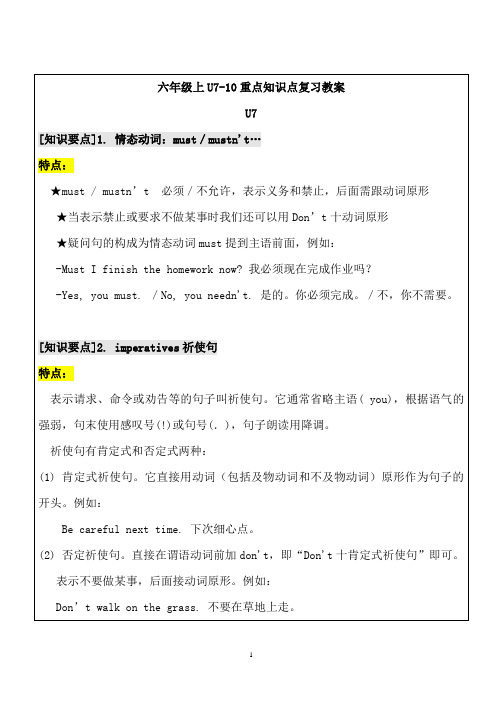
六年级上U7-10重点知识点复习教案U7[知识要点]1. 情态动词:must/mustn't…特点:★must / mustn’t 必须/不允许,表示义务和禁止,后面需跟动词原形★当表示禁止或要求不做某事时我们还可以用Don’t十动词原形★疑问句的构成为情态动词must提到主语前面,例如:-Must I finish the homework now? 我必须现在完成作业吗?-Yes, you must. /No, you needn't. 是的。
你必须完成。
/不,你不需要。
[知识要点]2. imperatives祈使句特点:表示请求、命令或劝告等的句子叫祈使句。
它通常省略主语( you),根据语气的强弱,句末使用感叹号(!)或句号(.),句子朗读用降调。
祈使句有肯定式和否定式两种:(1) 肯定式祈使句。
它直接用动词(包括及物动词和不及物动词)原形作为句子的开头。
例如:Be careful next time. 下次细心点。
(2) 否定祈使句。
直接在谓语动词前加don't,即“Don't十肯定式祈使句”即可。
表示不要做某事,后面接动词原形。
例如:Don’t walk on the grass. 不要在草地上走。
易错易混练I. Choose the best answer. (选择最佳答案)( ) 1. We mustn't ______ loudly in the public places.A. speakB. tellC. talkD. ask( )2. Everyone should not______________the class rules.A. breaksB. brokeC. breakD. breaking( ) 3. Please don't be late school again, Sandy.A. toB. forC. fromD. with ( )4. If you want to enter the room, the_______________is on the left.A. entranceB. windowC. classD. exit( )5. Many people are _____ the bus at the bus station now.A. wait forB. waits forC. waited forD. waitingforII. Choose the right word to complete the sentence. (选择适当的词填空)1. —I want to buy a pair of new shoes.—Please _________ ( go upstair; go upstairs).2. ____________________ Please don't eat (in; or) drink in the library.3. _________________ What's the ( mean; meaning ) of the word?4. _____________________ Please don't chase (others; each other) inthe classroom.U8[知识要点]1. present perfect tense 现在完成时特点:(1)现在完成时的构成是:have(has)+过去分词,表示继续、完了、结果和经验等四种意思。
沪教牛津版六年级英语下(Unit7 基础知识梳理)

精锐教育学科教师辅导讲义Step1: Greetings & Free talkHow are you today? Is there something interesting or important this week?What have you learned in your school? (询问学校课程进度)Step2: Lead in—学海拾贝If you doubt yourself , then indeed you stand on shaky ground .(Ibsen , Norwegian dramatist ) 如果你怀疑自己,那么你的立足点确实不稳固了。
(挪威剧作家易卜生)Step3: Words and expressions.Ⅰ. Words.1. fare n.车费;船费e. g. How much is the fare to Beijing? 到北京车费要多少?fare-box n.投币箱e. g. People put their money in the fare-box and then they can get into the bus.人们先将钱投入投币箱,然后才可以到车里面去。
8. still adv.还是,仍然e. g. -Mum, I'm still hungry! 妈妈,我还是饿!-Have another piece of cake then. 再吃块蛋糕吧。
9. perhaps adv. 也许;可能;大概e. g. Perhaps the letter will come today.也许那封信今天能到。
Perhaps they are in need of our help.也许他们需要我们的帮助。
【知识拓展】近义:maybe adv.大概,也许反义:certainly adv.的确;当然10. few adj.很少,几乎没有e. g. -Are there many fish in the pond? 池塘里鱼多吗?-Very few. 很少。
2021-2022学年牛津上海版六年级下学期知识梳理Unit7知识梳理

IL词汇1.单词表1.花园城的出行乘公共汽车/渡船/地铁出行2.一辆单层汽车一辆双层汽车3.一个投币箱[fare车费]一张公共交通卡4.一辆空调车在过去[过去时]5.现今[现在时]十年后【用how soon提问;时态:将来时】6.从・・・・・・买票从乘客那里收钱7.不得不;必须(不必)做某事把钱放进投币箱8.用替代和……讨论9.考虑;思考;想一想制作一张有关……的海报3.重点词汇double-decker n.1.n.车费a fare box投币箱adj.公共的the public公众,民众in public在公开场合2.n.交通,运输V.运输n.售票员,导体conduct v.引导,表现,导电3.adv. 现今these days in the past 过去adv.更替,代替instead of sth./ doing4.single-decker n.5.pron. 大多数most ofpron.没有一个none of +单数、复数6.adv,仍然,依旧,还是adj.静止adv, 也许, 大概, 可能二maybe == certainly adv.确信,确定7.adj.不多的,很少的fewer fewest little less leastn.交通阻塞,堵车(复数)traffic jams 14.n.轻便摩托车=motorbikeflyover n.15.n.铁路highway高速路n.人行道16.n.隧道n.桥17.n.人行横道,十字路口二crossroadat the crossing在十字路口zebra crossing 斑马线cross v.穿越n.人行桥18.n. 海报the poster 张贴海报III.语法1.What will travelling in our city be like in 10 years' time?=How will travelling in our city be in 10 years5 time?What...be like? …怎么样?be like4ook likelike prep.像・・.一样e.g. Our school is like a garden.She looks like her mother.He likes reading detective stories. like v. 喜欢in 10 years9 time=in 10 years 十年后(常与一般将来时连用)in one year's time 用 How soon 提问e.g. The young man will finish riding around the country in two years time.How soon will the young man finish riding around the country?2.there be句型表示事物的存在在什么地方有什么一般现在时:There is4re一般过去时:There wasAvere一般将来时:There will be/ There is/are going to be3.all offnost ot^some ofhone ofall o%nost o%omeof做主语时,后面的名词为复数,谓语动词也为复数e.g. All of the students wear school uniforms.none of做主语时,既可用复数谓语动词,也可用单数谓语动词e.g. None of us enjoy(s) getting up early.4.have to do 不得不否认形式:don't have to do = needn't dcydoift need to do 不需要e.g. I have to stay at home.否认句I don't have to stay at home.和must的区别:have to do 强调客观的需要,有人称,时态的变化must 强调主观的意愿,没有人称,时态的变化 e.g. He broke his leg, so he had to lie in bed for several days. She must study hard, because she wants to be a doctor.5. instead 和 instead ofinstead 单独用于句首句尾,是副词instead of 用于名词,代词或介词短语前e.g. I don't like the red one, give me the black one instead.=Give me the black one instead of the red one. 6. travel v.旅行 traveler n.旅行者collect...from 从收集7. make a poster 制作海报Exemplify (例题分析)Exemplify (例题分析) L Choose the best answer.1. Our school will be more beautiful.A , two years ago B. after two year time C . in two years time time 2. I'm sure there will be traffic jams in the future.A. lessB. fewerC. most3. . Nowadays, in most buses in Shanghai there is no conductor collecting moneyA. fromB. forC. with 4. There are many in our city.A. man nursesB. men nursesC. man nurse5. You can see a lot of people on the Nanjing Road Walkway.A. walksB. to walkC. walking6. Passengers don't buy tickets now. They put money in a box.A. alsoB. tooC. instead7. Mr. Black has got a daughter and a son and of them are students.A. bothB. neitherC. none8. What Shanghai in 10 years 9 time?L Choose the best answer.9.Our school will be more beautiful.A , two years ago B. after two year time C . in two years time time10.I'm sure there will be traffic jams in the future.A. lessB. fewerC. most11.. Nowadays, in most buses in Shanghai there is no conductor collecting moneyA. fromB. forC. with12.There are many in our city.A. man nursesB. men nursesC. man nurse13.You can see a lot of people on the Nanjing Road Walkway.A. walksB. to walkC. walking14.Passengers don't buy tickets now. They put money in a box.A. alsoB. tooC. instead15.Mr. Black has got a daughter and a son and of them are students.A. bothB. neitherC. none16.What Shanghai in 10 years9 time? , in two years'.few passengers. ・at, man nurse ・ to walking , either.all9. My brother has Shanghai for two years.14. In the past, people traveled Puxi Pudong by ferry.A. from...toB. in...byC. from...forD. by...toBoys wear white shirts short sleeves every school day. A. inB. forC. withD. onIL Complete the sentences with the given verbs in their proper forms1. In the past, there were no buses, (air-condition)Perhaps there will be flyovers in our city in the coming years.(many)2. What will in Shanghai be like in 10 years' time? (travel)Maybe there will be more car and bicycles, (few)3. Most of the nurses in this hospital are ・ (woman)Peter will go on to Hong Kong University next year, (possible)III. Rewrite the sentences as required.1. Traveling by bus was not very comfortable.(对戈ij 线局部提问) traveling by bus?2. There are much traffic in our city.(改为一般将来时的否认句) There much traffic in our city.3. John had a computer lesson once a week.(对划线局部提问) How John have a computer lesson?A. will, likeB. is, likeC. is, be likeD. will, be like A. gone from B. left C ・ been away from D. been away10. He can the windows and doors. But he cannot do any well.11. He can the windows and doors. But he cannot do any well. A. cleaning, cooking B. cleaning, cook 12. Will you give me food?A. manyB. someC. clean, cooking 13. I spend three hours to the museum.A. take busB. by busC. walkingD. clean, cookD. stillD. on foot14. Tomorrow I'm going to see my aunt. It is ・A. five minute walkB. five minutes walk C ・ five minute's walkC ・ five minute's walkD ・ five minutes' walk4.Do you want to have a drink?(保持句意基本不变)you to have a drink?5.Lefs have a barbecue,?(改为反意疑问句)I. Choose the best answer (根据短文内容,选择最恰当的答案)Mr. Hill arrives at London Airport, at the end of a three-week holiday in France. Usually he wears a beard(留胡须).Since it has been hot there, he has taken it off. But his passport photo shows him with his beard.An officer looks at the photo for a moment, and says, n Excuse me, and please sit down. I won't keep you long/9 With this, he walks away, shows the photo to a second officer and says, n I know that face." The second officer looks at the passport and asks where Mr. Hill has come from. When he hears that Mr. Hill has arrived back from Paris, the second officer smiles and says, "An Englishman with a beard stole a painting in Paris on Friday, and that man looks just the kind of man..."Suddenly the first officer thinks of who Mr. Hill is. He returns to him, and asks, n Did you teach at theNo. 2 High School?^^ When Mr. Hill answers, in surprise, that he did. The first officer smiles and says, n I thought so. Pm Jack Smith. You taught me French. You haven't changed a bit."1.Mr. Hill.A.has just come back from the airportB.is on his way to PairsC.spent three weeks in Pairs before he went to FranceD ・ has been in France for three weeksMr. Hill.A.has a beard on his face but not in his photoB ・ grew a beard while he was on holidayC.has a beard in his photo but not on his faceD.took his beard off long before he went to holidayThe first officer is sure.A. Mr. Hill stole the paintingB. he has seen the face in the photo beforeC. he knows the second officer's faceD. a man without a beard stole the paintingThe second officer say that.A. Mr. Hill stole the paintingB , a man with a beard, from France, stole a painting in EnglishC ・ an Englishman took his beard off and stole a paintingD. a man with a beard, from England, stole a painting in PairsMr. Hill taught. A. Jack Smith French at the No.2 High School B ・ Jack Smith to be a first office C. at the No.2 High School, in FranceD. French some years ago and his name was Smith, not Hill IL Choose the words or expressions and complete the passage (选择最恰当的单词或词语完 成短文):Mr. Yang worked in a big company. One morning he 1 some important papers at homeso he had to run back to get them. As he was trying to open the door, an old woman came down the hallway. As soon as she saw him, she started 2 for help. She thought Mr. Yang was a thief. She wanted 3 to stop him.When she knew that it was Mr. Yang's apartment, she was very 4. She felt bad aboutwhat she did. Mr. Yang said it was not her fault (错误),and that he knew clearly 5 it could happen. It was really his fault 6 he didn't try to get to know the people living around him.There is a famous Chinese saying, "Neighbors nearby are more helpful than relatives (亲戚)far away." So each of us should try our best to know our neighbors and get on well with them.IIL Read the passage and fill in the blanks with proper words (在短文的空格内填入适当的 词,使其内容通顺,每空格限填一词,首字母已给) Passage 1Come to the Lucky Island - the holiday island f 1 young people. Lucky Island has gottwo beautiful beaches. You can swim in the sea or go windsurfing. Or you can swim in our Olympic Swimming Pool. There are lots things to do on Island. There's tennis court. You can have picnic in the forest. You can c 2 the hills. You can fish in the river. In the evening, you can dance atSharks Disco. There 9s a cinema too. We show a new film every day. You can buy food at the supermarket o 3 you can eat at the Blue Dolphin R 4. There is a gift shop, too, and apost office. Come to the Luck Island for a w 5 holiday. Passage 2A doctor was once teaching a class of students at a famous hospital in London. An injured (受 伤)man came in, and the doctor turned to one of the students and asked him, "What's w 1with this man?")1. A. left )2. A. laughing )3. A.anybody )4. A. angry )5. A. how)6. A. so B. lost B. jumping B. nobody B. sorry B. whenB. becauseC. wrote C. running C. somebody C. excited C. whyC. andD. found D. shouting D. everybody D. happy D. whereD. but“I don't know, sir," the student answered, "Shall I examine (检查)him and f 2 out?”“There is no need to examine himjsaid the doctor."You should know w 3 askingquestions. He hurt his right knee (膝盖).Didn't you notice the way he walked? He hurt it by b 4. You can know from his trousers. This is Monday morning. Yesterday was f 5, buton Saturday the roads were wet. Look at the man's trousers. He fell down on Saturday night.^^ The doctor then turned to the man and said, "You got some m 6 on Saturday and wentto have a drink at some place in the street. You fell down and got wet on the way home. You tried to dry your clothes by the f 7 when you got home. But because you drank too much, you fellon the fire and burnt your knee. Is that right?^^IV Answer the questions (根据短文内容回答下列问题)The People's Republic of China is a large country. It has fifty-six nations. There are all kinds of activities to celebrate the Chinese New Year. The celebrations all over the country are generally the same.Decorations are important feature of celebrations of the Chinese New Year. One of the main forms of decorations is 'red couplef. Before the Chinese New Year, most of Chinese families go to the markets to buy a pair of couplets. Sometimes people ask some famous artists to write some Chinese good luck saying on red paper, often with gold trimming on it. They are usually made up of four Chinese characters with asking for luck in long life and wealth.People usually put up these couplets on the front door of their houses before Chinese New Year. Some of them usually take them down after the New Year's celebrations, some of them even keep them up all year long in the hope of keeping good luck.1.Are the celebrations for Chinese New Year all over the country generally the same?2.What are important feature of the celebrations for the Chinese New Year?3.What is one of the main form of decorations?4.Where do people write Chinese good luck saying?。
【牛津小学英语六年级】第七单元词汇语法解析(1)
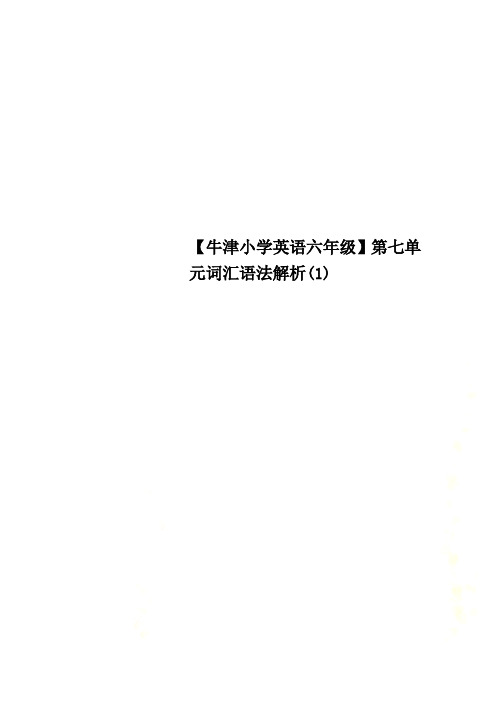
【牛津小学英语六年级】第七单元词汇语法解析(1)【牛津小学英语六年级】第七单元词汇语法解析(1)Unit 5 Listening and SpeakingWord box1. ground n. 地面;地。
My parents live on the ground floor.我父母住在底楼。
2. invitation n. 请柬1. gym 健身房,体育馆2. It’s on the second floor.在三楼。
英式:the ground floor一楼;the first floor 二楼美式:the first floor一楼;the second floor 二楼3. Kitty and her classmates took some photos for the English Club on the Open Day.(1)take some photos for the English Club(2) on the Open Day(3) take photos4. They visited our classroom at two fifteen.Visit的过去式是visited,在课文35页,都是过去的发生的动作,所以用过去式。
take-took, listen-listened, visit-visitedarrive-arrived, have-had, look-looked5. Our parents had a great time!Have a great time=have a good time6. welcome the parents7. in different places8. on the second floor9. in the hall10. in the Music room11. write an invitation to sbWrite an invitation to her parents.12. 一般将来时(1)Will +动词原形(2) 肯定式:I will go to see a film.(3) 否定式:I won’t go to see a film.(4) 疑问式:Will you go to see a film? *常与tomorrow ,Next week连用13. 一般过去时(1)常与这些词连用:yesterday, the day before yesterday, last week, a moment ago, in 1990(2)肯定式:I worked.(3)否定式:I didn’t work.(4)疑问式:Did you work?(5)规则动词过去式的变化方式:work-worked, open-openedmove-moved, live-livedtry-tried, study-studiedplan-planned, stop-stopped——【长春藤英语分享】。
牛津英语6B7,8单元知识点
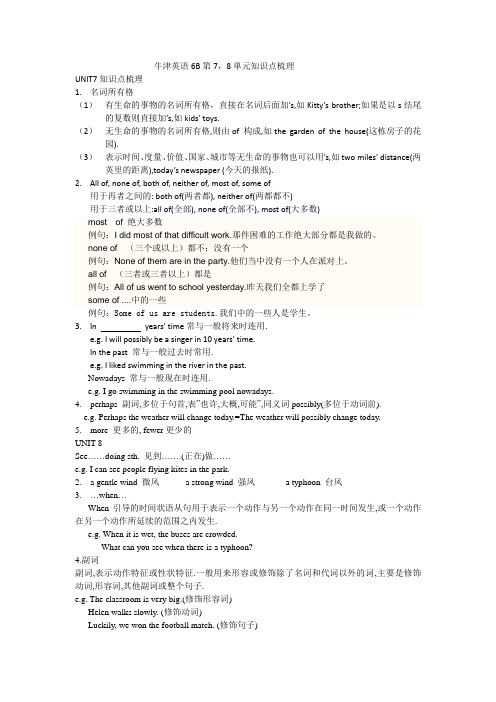
牛津英语6B第7,8单元知识点梳理UNIT7知识点梳理1.名词所有格(1)有生命的事物的名词所有格,直接在名词后面加’s,如Kitty’s brother;如果是以s结尾的复数则直接加’s,如kid s’ toys.(2)无生命的事物的名词所有格,则由of 构成,如the garden of the house(这栋房子的花园).(3)表示时间、度量、价值、国家、城市等无生命的事物也可以用’s,如two miles’ distance(两英里的距离),today’s newspaper (今天的报纸).2.All of, none of, both of, neither of, most of, some of用于再者之间的: both of(两者都), neither of(两都都不)用于三者或以上:all of(全部), none of(全部不), most of(大多数)most of 绝大多数例句:I did most of that difficult work.那件困难的工作绝大部分都是我做的。
none of (三个或以上)都不;没有一个例句:None of them are in the party.他们当中没有一个人在派对上。
all of (三者或三者以上)都是例句:All of us went to school yesterday.昨天我们全都上学了some of ....中的一些例句:Some of us are students.我们中的一些人是学生。
3.In years’ time常与一般将来时连用.e.g. I will possibly be a singer in 10 years’ time.In the past 常与一般过去时常用.e.g. I liked swimming in the river in the past.Nowadays 常与一般现在时连用.e.g. I go swimming in the swimming pool nowadays.4. perhaps 副词,多位于句首,表”也许,大概,可能”,同义词possibly(多位于动词前).e.g. Perhaps the weather will change today.=The weather will possibly change today.5. more 更多的, fewer更少的UNIT 8See……doing sth. 见到…….(正在)做……e.g. I can see people flying kites in the park.2. a gentle wind 微风 a strong wind 强风 a typhoon 台风3. …when…When引导的时间状语从句用于表示一个动作与另一个动作在同一时间发生,或一个动作在另一个动作所延续的范围之内发生.e.g. When it is wet, the buses are crowded.What can you see when there is a typhoon?4.副词副词,表示动作特征或性状特征.一般用来形容或修饰除了名词和代词以外的词,主要是修饰动词,形容词,其他副词或整个句子.e.g. The classroom is very big.(修饰形容词)Helen walks slowly. (修饰动词)Luckily, we won the football match. (修饰句子)大部分副词是在形容词的词尾上加”ly”而构成的.如果形容词末尾的一个字母是”y”, 而这个”y”之前是一个辅音字母,在构成副词时,须将”y”改为”i”, 再加”ly”.5.情态动词may, shouldMay作为情态动词,主要有下面几种用法:用来提出问题,问可不可以e.g. May I come in?(2)用于陈述句,表示”可以”或”不可以”e.g. You may come if you wish.Dogs may not be taken into shops.表示”可能”e.g. This book may be Peter’s.should作为情态动词,表示”应该,应当”.e.g. We should stay at home when there is a typhoon.。
饶河县一小六年级英语语法 第七单元 词汇语法解析素材2 牛津版
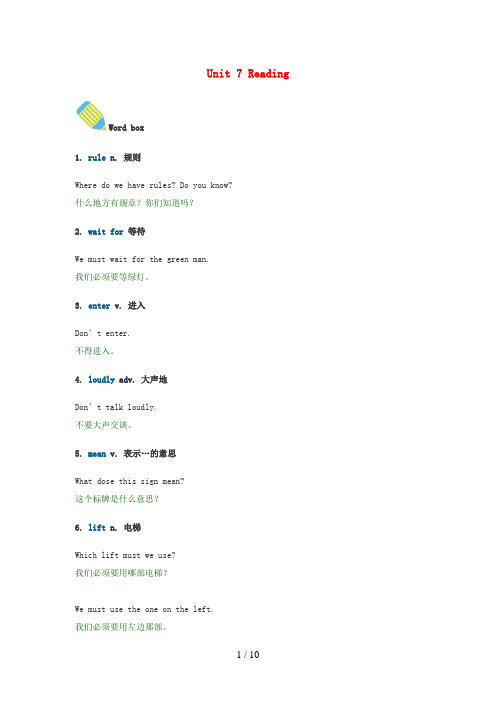
Unit 7 ReadingWord box1. rule n. 规则Where do we have rules? Do you know?什么地方有规章?你们知道吗?2. wait for等待We must wait for the green man.我们必须要等绿灯。
3. enter v. 进入Don’t enter.不得进入。
4. loudly adv. 大声地Don’t talk loudly.不要大声交谈。
5. mean v. 表示…的意思What dose this sign mean?这个标牌是什么意思?6. lift n. 电梯Which lift must we use?我们必须要用哪部电梯?We must use the one on the left.我们必须要用左边那部。
7. escalator n. 自动扶梯Which escalator must we use?我们必须要用哪部自动扶梯?We must use the one in the middle. 我们必须要用中间的那部。
8. on the left在左边on the right在右边in the middle在中间Language focus1. We must not leave rubbish.我们必须不能乱扔垃圾。
We must keep quiet.我们必须保持安静。
must必须,表示必要或很重要must not不准,表示不允许或禁止2. Don't enter.不得进入。
这是祈使句的否定。
祈使句(imperative)是用来要求,命令某人做某事的句子。
e.g.Enter the door.(肯定)Keep quiet.(肯定)Don’t enter the door.(否定)Don’t keep quite.(否定)3.表示禁止的三种方式:We must run on the road.Don’t enter.No parking.Unit 1 A family outingModule 10 Unit 1 We are going to different schools一、汉译英。
牛津沪教版六年级上Unit7-8重要知识点复习

Unit7-Unit8复习教案Ⅰ. Unit7重要知识点复习1.mean v表示…….的意思;意味,包含;打算,意欲meaning n. 意思,意义;含义【拓展】mean to do sth. 和mean doing sth.的区别mean to do sth. 打算做某事=plan to do sth.mean doing sth. 意味着做某事2.centre n. 中心;中央central adj. 中心的;中央的in the center of…在……的中心3.upstairs adv. 在楼上;往楼上downstairs ad. 在楼下;往楼下go upstairs/ downstairs 上/下楼4.middle n. 中间,中央adj. 中间的,居中的in the middle 在……的当中5.We must not pick the flowers. 我们不可以摘花。
pick the flowers意为“摘花”【辨析】pick与pick upI.Choose the best answer (选择) (错误率:掌握情况:)1.Choose the word that does not belong to the group.A.whereB. whoC. whenD. what2.It is about five ________ ['mɪnɪt s]walk from my home to school.A.minuteB. minutesC. minute’sD. minutes’3.Jacky,here is a present _______ you. Happy birthday.A.withB. byC. forD. on4.Ben,you are getting fatter. Don’t eat _______ meat.A.too muchB. too manyC. too fewD. too little5.This famous scientist died _______ the morning of Jan.8,1996.A.atB. inC. onD. /6.Wendy’s mother is sick now,so Wendy has to _______ her little brother.A.look upB. look atC. look forD. look after7.Miss Tang told her students _______ for school any longer.A.to be lateB. not to be lateC. to not be lateD. not to late8.The new iphone doesn’t look the same ________ the old one.A.asB. likeC. ofD. to9._______ will your uncle come back from Beijing? In two weeks.A. WhenB. How longC. How soonD. How far10.I’d like _______ part in the reading contest because I like _______.A.to take;readB. take;to readC. to take;readingD. taking;reading11.There are over _______ books in our school library.A.two thousandB. thousand ofC. two thousandsD. thousands of12.The music played by Langlang sounds _______.A.wonderfulB. beautifulC. sweetlyD. well13.Tim hold a bottle of water in one hand and some books in his _______ hand.A.anotherB. the otherC. otherD. one14.Linda wants to _______ if her classmates like their school.A.findB. find outC. look forD. look15.Shall we go to plant some trees in the park? ________.A.Yes,we shall.B. That’s right.1.默写两个单元的单词和词组。
牛津译林英语六年级上册Unit7词汇、知识点梳理
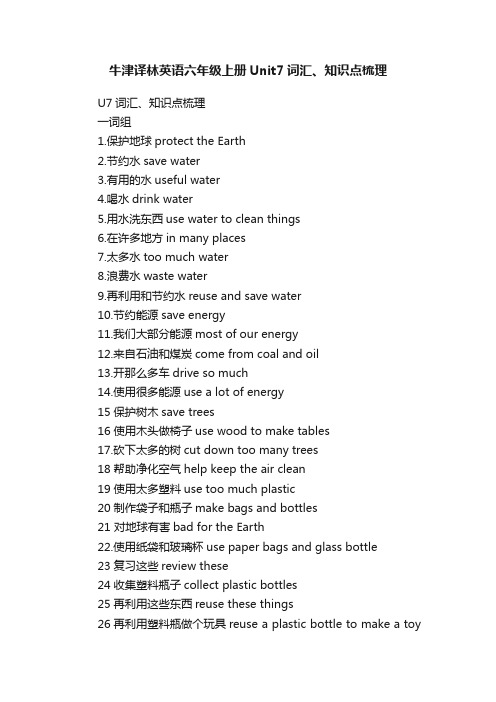
牛津译林英语六年级上册Unit7词汇、知识点梳理U7词汇、知识点梳理一词组1.保护地球protect the Earth2.节约水save water3.有用的水useful water4.喝水drink water5.用水洗东西use water to clean things6.在许多地方in many places7.太多水too much water8.浪费水waste water9.再利用和节约水reuse and save water10.节约能源save energy11.我们大部分能源most of our energy12.来自石油和煤炭come from coal and oil13.开那么多车drive so much14.使用很多能源use a lot of energy15保护树木save trees16使用木头做椅子use wood to make tables17.砍下太多的树cut down too many trees18帮助净化空气help keep the air clean19使用太多塑料use too much plastic20制作袋子和瓶子make bags and bottles21 对地球有害bad for the Earth22.使用纸袋和玻璃杯use paper bags and glass bottle23复习这些review these24收集塑料瓶子collect plastic bottles25再利用这些东西reuse these things26再利用塑料瓶做个玩具reuse a plastic bottle to make a toy27再利用纸做个盒子reuse paper to make a box28实在是酷really cool29 地球日Earth Day30保护和热爱我们的地球love and protect our Earth31 做一个课题do a project32应该知道这个should know this33.制作一张海报make a poster34告诉他们关于它tell them about it35 开始画start drawing36先画地球draw the Earth first37 蓝色和棕色blue and brown38树和花trees and flowers39在树上画些水果draw some fruit on the tree40画个垃圾箱draw a rubbish bin41放在学校门口put it at the school gate42保持它的整洁keep it clean43怎样保护地球how to protect the Earth44用**干** use ….to….45世界环境日World Environment Day二语音OO组合/u:/ cool food room school zoo noon(比较多)/u/ cook classroom bedroom bathroom look foot football good book三句子1.Water is useful.2.We drink water and use water to clean things every day.3.In many places,there isn’t much water.4.We shouldn’t waste water.5.We should reuse and save the water.6.Most of our energy comes from coal and oil.7.There is not much coal or oil on Earth.8.We should save energy.9.We shouldn’t drive so much because cars use a lot of energy.10.Wood comes from trees.11.We use wood to make tables,chairs and many other things.12We shouldn’t cut down too many trees because trees help keep the air clean. 13Don’t use too much plastic.14We use plastic to make bags and bottles.15 Too much plastic is bad for the Earth.16 We shouldn’t use too many plastic bags or bottl es.17.We should use paper bags and glass bottles.18The earth is our home.1.All the students should know this.2.Let’s make a poster and tell them about it.3.The poster is ready.They put it at the school gate.4.We should protect the Earth and keep it clean.5.To protect the Earth,what should we do?What should we not do?四语法1.to 后面加动词原形2.should 后面加动词原形3.日期的表达:在4月22日On 22nd AprilOn the 22nd of AprilOn April 22nd。
新牛津译林版英语六年级上册Unit7语法总结与练习
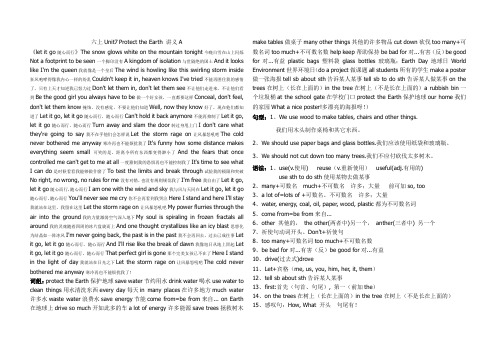
六上Unit7Protect the Earth 讲义A《let it go随心而行》The snow glows white on the mountain tonight今晚白雪在山上闪烁Not a footprint to be seen一个脚印没有A kingdom of isolation与世隔绝的国土And it looks like I'm the queen我就像是一个皇后The wind is howling like this swirling storm inside 狂风咆哮得像我内心一样的纷乱Couldn't keep it in, heaven knows I've tried不能再困住我的感情了,只有上天才知逆我已努力过Don't let them in, don't let them see不让他们走进来,不让他们看到Be the good girl you always have to be做一个好女孩,一直都要这样Conceal, don't feel, don't let them know掩饰、没有感觉、不要让他们知道Well, now they know好了,现在他们都知道了Let it go, let it go随心而行,随心而行Can't hold it back anymore不能再抑制了Let it go, let it go随心而行,随心而行Turn away and slam the door转过身甩上门I don't care what they're going to say我不在乎他们会怎样说Let the storm rage on让风暴怒吼吧The cold never bothered me anyway寒冷再也不能烦扰我了It's funny how some distance makes everything seem small可笑的是,距离令所有东西都变得渺小了And the fears that once controlled me can't get to me at all一度箝制我的恐惧再也不能控制我了It's time to see what I can do是时候看看我能够做什麼了To test the limits and break through试验我的极限和突破No right, no wrong, no rules for me没有对错,也没有规则规范我了I'm free我自由了Let it go, let it go随心而行,随心而行I am one with the wind and sky我与风与天同在Let it go, let it go 随心而行,随心而行You'll never see me cry你不会再看到我哭泣Here I stand and here I'll stay 我就站在这里,我留在这里Let the storm rage on让风暴怒吼吧My power flurries through the air into the ground我的力量激荡空气深入地下My soul is spiraling in frozen fractals all around我的灵魂随着四周的冰片盘旋而上And one thought crystallizes like an icy blast思想化为结晶如一阵冰风I'm never going back, the past is in the past我不会再回去,过去已成往事Let it go, let it go随心而行,随心而行And I'll rise like the break of dawn我像旭日从地上冒起Let it go, let it go随心而行,随心而行That perfect girl is gone那个完美女孩已不在了Here I stand in the light of day我就站在日光之下Let the storm rage on让风暴怒吼吧The cold never bothered me anyway寒冷再也不能烦扰我了!词组:protect the Earth保护地球save water节约用水drink water喝水use water to clean things用水清洗东西every day每天in many places在许多地方much water 许多水waste water浪费水save energy节能come from=be from来自... on Earth 在地球上drive so much开如此多的车a lot of energy许多能源save trees拯救树木make tables做桌子many other things其他的许多物品cut down砍伐too many+可数名词too much+不可数名数help keep帮助保持be bad for对...有害(反)be good for对...有益plastic bags塑料袋glass bottles玻璃瓶;Earth Day地球日World Environment世界环境日(do a project做课题all students所有的学生make a poster 做一张海报tell sb about sth告诉某人某事tell sb to do sth告诉某人做某事on the trees在树上(长在上面的)in the tree在树上(不是长在上面的)a rubbish bin一个垃圾桶at the school gate在学校门口protect the Earth保护地球our home我们的家园What a nice poster!多漂亮的海报呀!)句型:1、We use wood to make tables, chairs and other things.我们用木头制作桌椅和其它东西。
- 1、下载文档前请自行甄别文档内容的完整性,平台不提供额外的编辑、内容补充、找答案等附加服务。
- 2、"仅部分预览"的文档,不可在线预览部分如存在完整性等问题,可反馈申请退款(可完整预览的文档不适用该条件!)。
- 3、如文档侵犯您的权益,请联系客服反馈,我们会尽快为您处理(人工客服工作时间:9:00-18:30)。
Unit 7 Listening and Speaking
Word box
1. centre n. 中心;中央
We are entering the centre.
我们正在进入这个中心。
2. exit n. 出口,反义词:entrance n. 入口
The entrance is on the right and the exit is on the left.
入口在右边,出口在左边。
3. upstairs adv. 向楼上,在楼上;反义词:downstairs adv. 向楼上,在楼上
go upstairs
上楼
go downstairs
下楼
Tom lives upstairs, and Mary lives downstairs.
汤姆住在楼上,马丽住在楼下。
4. middle n. 中间,中央
In the middle
在中间
We are going upstairs.
我们正在上楼。
Which escalator must we use?
我们必须要用哪部自动扶梯?
We must use the one in the middle.
我们必须要用中间的那部。
5. chase v. 追赶
We must not chase each other in the classroom. 在教室里,我们必须不能互相追赶。
Language focus
1. in the classroom
in the library
in the park
on the road
2. What does this sign mean?
3. leave our bicycles。
